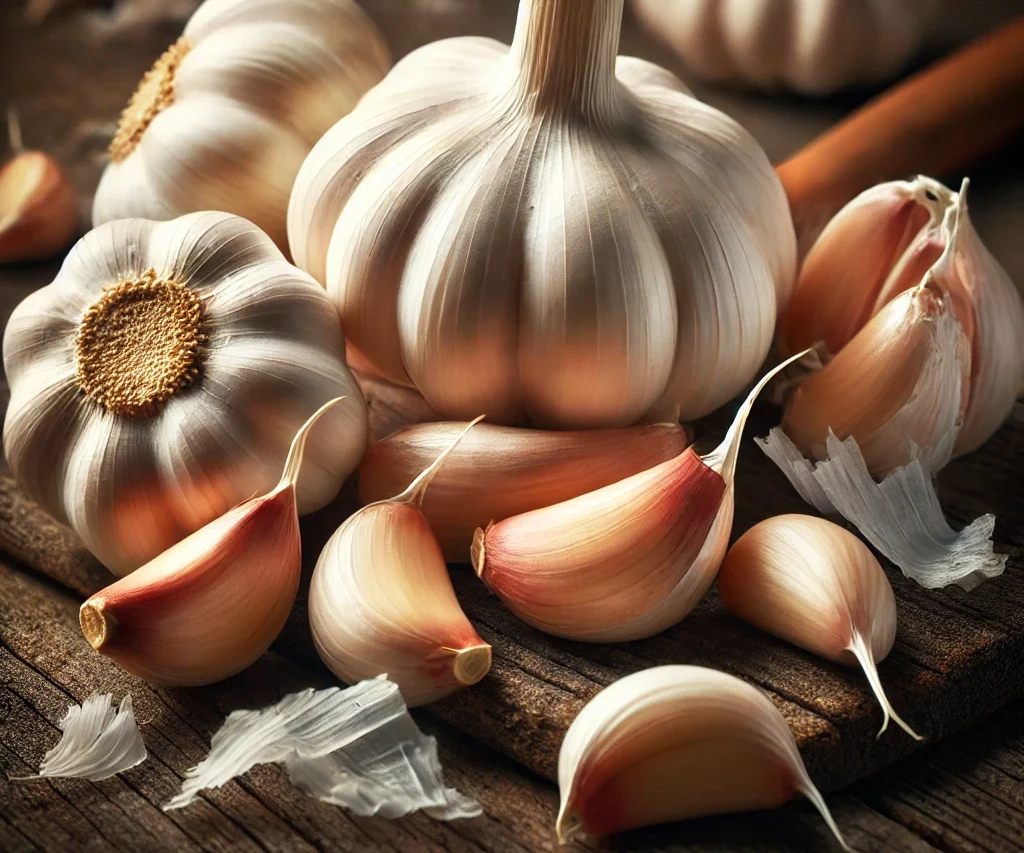Garlic, a pungent and aromatic bulb, has been prized for centuries not only for its bold flavor but also for its powerful health benefits. Packed with essential nutrients like vitamins C and B6, as well as sulfur compounds such as allicin, garlic has long been used as both a culinary ingredient and a natural remedy. From supporting heart health to boosting the immune system, garlic offers a wide range of wellness advantages.
Health Benefits of Garlic
Boosts Immune System: Garlic strengthens the immune system, helping to fight colds, flu, and other infections. Studies show it may reduce the severity and duration of illnesses.
Supports Heart Health: Garlic reduces high blood pressure and cholesterol levels, improving overall cardiovascular health and reducing the risk of heart disease.
Rich in Antioxidants: Garlic contains antioxidants that help combat free radical damage, slowing the aging process and protecting against chronic diseases.
May Reduce Cancer Risk: Compounds in garlic, such as diallyl sulfide, have been linked to reduced risks of certain cancers, including colorectal and stomach cancers.
Improves Digestion: Garlic stimulates digestive enzymes, aids in nutrient absorption, and promotes gut health by reducing harmful bacteria.
Anti-Inflammatory Properties: Garlic’s sulfur compounds reduce inflammation, making it helpful for conditions like arthritis and other inflammatory diseases.
Natural Detoxifier: Garlic supports liver health and helps the body eliminate heavy metals and toxins.
Regulates Blood Sugar: Garlic may improve insulin sensitivity and lower blood sugar levels, offering benefits for people with diabetes.
Fights Infections: Garlic’s antimicrobial properties make it an effective natural remedy for fighting infections. It can help combat bacterial, viral, and fungal infections, especially when consumed raw.
Enhances Bone Health: Garlic has been shown to increase estrogen levels in women, which may help improve bone density and reduce the risk of osteoporosis. It can be especially beneficial for older adults.
Uses of Garlic
Culinary Uses
Flavor Enhancer: Garlic is a staple in cuisines worldwide. It adds a pungent, savory flavor to dishes, whether raw, roasted, sautéed, or fried.
Raw Garlic: Used in dressings, dips, and spreads like garlic aioli or hummus for a sharp and strong flavor.
Cooked Garlic: Sautéed or roasted garlic mellows and sweetens, making it perfect for soups, stews, pasta sauces, and roasted vegetables.
Garlic Powder: A dried form of garlic often used in spice blends, marinades, and rubs for meats and vegetables.
Garlic Oil: Infused garlic oil is used for cooking, dressing salads, or drizzling over dishes for added flavor.
Pickled Garlic: A tangy, mild form often used as a garnish or snack.
Black Garlic: A fermented form of garlic with a sweet, molasses-like flavor, often used in gourmet dishes.
Health and Beauty
Immune Boosting: Garlic contains compounds like allicin that help fight infections and support immune function.
Heart Health: Regular consumption of garlic may reduce cholesterol levels, lower blood pressure, and improve blood circulation.
Antioxidant Properties: Garlic helps neutralize free radicals, reducing oxidative stress and inflammation.
Digestive Health: Garlic acts as a natural prebiotic, promoting healthy gut bacteria.
Skin and Hair: Garlic’s antibacterial and antifungal properties make it useful in treating acne and dandruff when used in DIY skincare or hair masks.
Household Uses
Natural Pesticide: Garlic can be used in homemade sprays to repel pests in the garden.
Disinfectant: Garlic’s antimicrobial properties make it a natural cleaner for surfaces when diluted in water.
Odor Neutralizer: Crushed garlic can absorb and neutralize odors, though the strong garlic smell may linger.
Safety Considerations
Digestive Sensitivity: Garlic may cause heartburn, bloating, or gas in some people, especially when consumed raw or in large quantities. Cooking garlic can make it gentler on the stomach.
Allergic Reactions: Rarely, garlic can cause allergic reactions, such as skin irritation, rashes, or difficulty breathing. If you suspect an allergy, avoid garlic and consult a doctor.
Interaction with Medications: Garlic can thin the blood, so individuals taking anticoagulant medications (like warfarin) or preparing for surgery should use caution. It may also interact with medications for blood pressure, diabetes, and HIV.
Skin Irritation: Direct application of raw garlic on the skin can cause irritation or burns. Always dilute if using garlic for topical purposes.
Storage and Safety: Raw Garlic: Store in a cool, dry, and well-ventilated place. Do not refrigerate whole garlic bulbs, as it affects their flavor and texture.
Homemade Garlic Oil: Can harbor botulinum bacteria if improperly stored. Always refrigerate and consume within a week.
Conclusion
Garlic is more than just a flavorful addition to your meals; it’s a potent health-boosting powerhouse. Its active compounds, such as allicin, provide a range of benefits, from improving heart health and reducing inflammation to boosting immunity. Incorporating garlic into your meals regularly is a simple yet effective way to take advantage of its many health benefits.
